

If your answer is Yes for the former and No for the latter, this resource centre will help you understand better why you need to keep active and how you can do so if you wish to maintain your cognitive skills and still be able to answer a telephone call. Further reading on what are cognitive skills and abilities. By: Dr.
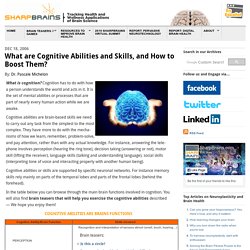
Pascale Michelon What is cognition? Cognition has to do with how a person understands the world and acts in it. It is the set of mental abilities or processes that are part of nearly every human action while we are awake. Cognitive abilities are brain-based skills we need to carry out any task from the simplest to the most complex. Cognitive abilities or skills are supported by specific neuronal networks.
In the table below you can browse through the main brain functions involved in cognition. With age, some cognitive abilities tend to decline, especially the so-called executive functions, The different type of cognitive abilities. The changes in cognitive abilities older adults experience. What happens when you lose your cognitive abilities. Every day we perform hundreds of cognitive tasks but are mostly unaware of the effort involved.
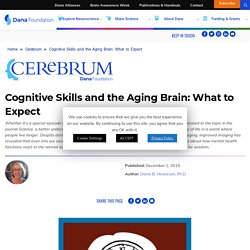
These tasks take different forms, such as noticing colors, remembering names, or calculating time on a watch. Effects of Exercise on Cognitive Abilities of Older Adults. The importance of physical activity exercise among older people as per Langhammer, Bergland and Rydwik, (2018) As researched by Baumgart et al. (2015) Regular exercise changes the brain to improve memory, thinking skills. There are plenty of good reasons to be physically active.
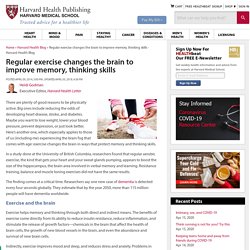
Big ones include reducing the odds of developing heart disease, stroke, and diabetes. Maybe you want to lose weight, lower your blood pressure, prevent depression, or just look better. Here’s another one, which especially applies to those of us (including me) experiencing the brain fog that comes with age: exercise changes the brain in ways that protect memory and thinking skills. In a study done at the University of British Columbia, researchers found that regular aerobic exercise, the kind that gets your heart and your sweat glands pumping, appears to boost the size of the hippocampus, the brain area involved in verbal memory and learning. Resistance training, balance and muscle toning exercises did not have the same results. The finding comes at a critical time. Active older adults less likely to become cognitively impaired, UF researchers find. An in-depth presentation on the impact of exercise on cognitive functioning by Dr Amy Jak. Hippocampal and Cerebral Blood Flow after Exercise Cessation in Master Athletes.
Introduction Endurance exercise training (exercise) produces physiological adaptations that enhance aerobic fitness and cardiovascular health (Brooks et al., 1996).
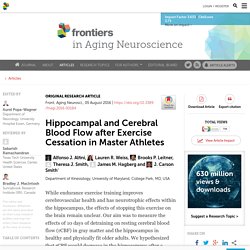
Consistent exercise effectively augments the maximal rate of oxygen consumption (O2max) centrally, by increasing cardiac output, and/or peripherally by widening the arterial-venous oxygen (A-O2) difference (Seals et al., 1981). O2max is the gold-standard index of cardiorespiratory fitness and is highly correlated with both morbidity and mortality (Hoekstra et al., 2008; Sawada et al., 2012), with greater fitness status associated with a reduced risk of chronic disease and a longer lifespan. In addition to enhancing the function of the cardiovascular system, exercise has been shown to increase bone density, improve muscle quality, and protect against metabolic dysfunction (Brooks et al., 1996). A growing body of empirical evidence supports the notion that exercise also robustly affects the human brain. Methods Participants. Inactivity can also cause a decrease in strength and stamina, making one more susceptible to chronic diseases.
World Health Organization's recommendation. Games for Seniors to Boost Their Memory While Having Fun. Stationary exercises for the less mobile older adult. Tai chi have been found to improve cognitive function. There are lots of jokes about forgetting where you put your keys, but as you get older, changes in your mental function are no laughing matter.
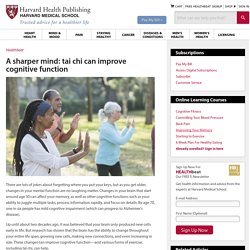
Changes in your brain that start around age 50 can affect your memory, as well as other cognitive functions such as your ability to juggle multiple tasks, process information rapidly, and focus on details. By age 70, one in six people has mild cognitive impairment (which can progress to Alzheimer's disease). Up until about two decades ago, it was believed that your brain only produced new cells early in life. But research has shown that the brain has the ability to change throughout your entire life span, growing new cells, making new connections, and even increasing in size. Simple balance exercises for older adults. Other ways to maintain cognitive abilities.
Cognitive health—the ability to clearly think, learn, and remember—is an important component of brain health.
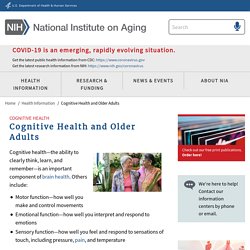
Others include: Eight Habits That Improve Cognitive Function. The New York Times recently published an article about the "brain fitness" business, "Do Brain Workouts Work?
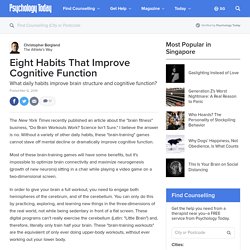
Science Isn’t Sure. " I believe the answer is no. Without a variety of other daily habits, these "brain-training" games cannot stave off mental decline or dramatically improve cognitive function. Most of these brain-training games will have some benefits, but it's impossible to optimize brain connectivity and maximize neurogenesis (growth of new neurons) sitting in a chair while playing a video game on a two-dimensional screen. In order to give your brain a full workout, you need to engage both hemispheres of the cerebrum, and of the cerebellum. Article continues after advertisement Although the cerebellum constitutes only 10 percent of the brain by volume, it houses over 50 percent of the brain's total neurons.